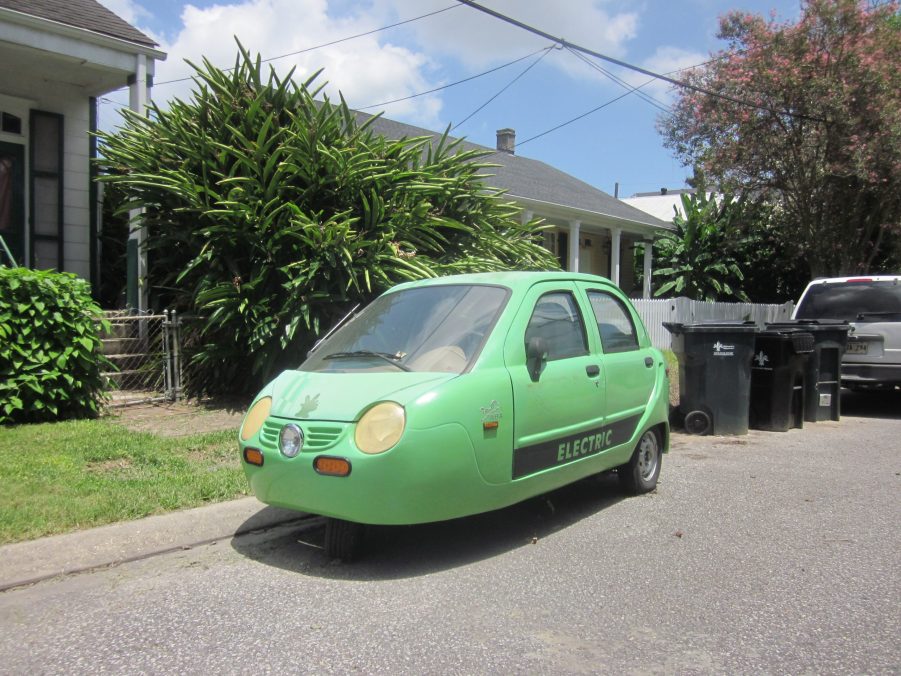
The Worst EVs of All Time Are Also Some of the Smallest
Many of the best electric cars built today take the shape of SUVs or long sedans, with some budget hatches sprinkled in. But on the opposite end of things, some of the worst EVs ever made are ridiculously small. Dismal range, little practicality, and awful designs are all packed into the smallest shells possible. These EVs were genuine attempts to make cheap electric cars, but missed the mark in one way or another.
The Sebring-Vanguard Citicar SV48 was a cheap, cheese wedge electric car

One can cut the Citicar SV48 some slack considering it was built in the 70s, but the sketchy build quality isn’t hard to spot. The sharp edges riveted together like an old steamliner and general cheese wedge aesthetic makes it an odd and ugly duckling.
It started with four lead-acid batteries that made a total of 48 volts of power. The estimated top speed was around 50mph, and the range was roughly 40 miles, which meant you couldn’t run this car for over an hour. But this slapped-together slab of steel was actually the highest production US-built electric car until the Tesla Model S came around.
2000 were built under the Citicar name, followed by 2000 more when they became the Commutacar. Then, in 1990, the patent was sold to Norwegian company Kewet, and built until October of 2013. Another 1,500 units rolled off the line, making about 7,000 over a non-consecutive 39-year timeframe. Something about this little lead-acid battery sled had to have worked for it to last that long.
The Corbin Sparrow was a one-seater electric high heel

First revealed at the 1996 San Fransico Auto Show, the Corbin Sparrow is an odd commuter vehicle with some promising numbers (especially in the 90s). Unlike the Citicar, the Sparrow could get up to 80mph and, on a good day, the range made it to 50. You still couldn’t run it for over an hour, but at least you could get up to speed. It could also be charged in 6 hours with a simple 110v outlet, convenient and quick.
During the week-long show, the concept received unexpected amounts of interest, and soon a factory was built to churn out these one-seater electric cars. However, production was rushed, and mistakes were made. Lithium-ion batteries hadn’t been developed yet, so the Sparrow ran on the same lead-acid tech used by the Citicar. 13 batteries, weighing over 600lbs in total. And if one of the batteries in the Sparrow died, the whole car was inoperable.
By 2003, Corbin Motors had run out of investor money and filed for bankruptcy. Only 289 Sparrows ever made it out of the factory, making it an incredibly strange and insanely rare EV.
The ZAP! Xebra is the worst electric car ever made

While the previous entries on this list were decent when first made, the ZAP! Xebra is a whole new level of atrocious. Despite being built in 2003, the Xebra only had a 40mph top speed and a 25 mile range. The Citicar from 30 years prior was faster and ran longer.
And yet, you’d also feel safer driving a Citicar, as the Xebra developed multiple brake issues in 2006, 2008, and 2012. It’s also classified as a motorcycle, which means it didn’t have to meet any safety regulations. And in early iterations, the Xebra couldn’t be left out in the rain. Water would seep in through the sharp and shoddy welds, short-circuiting the batteries and disabling the car.
The only saving grace of this car is that you could fit four people inside. Impressive for a three-wheeler, but would you want to stuff four people inside this crummy thing? Though perhaps it’s not fair to compare these cheap electric cars with the EVs of today. The technology still isn’t perfect, and the range isn’t quite where gas is. But progress is being made, and right now electric cars are better than ever before.


